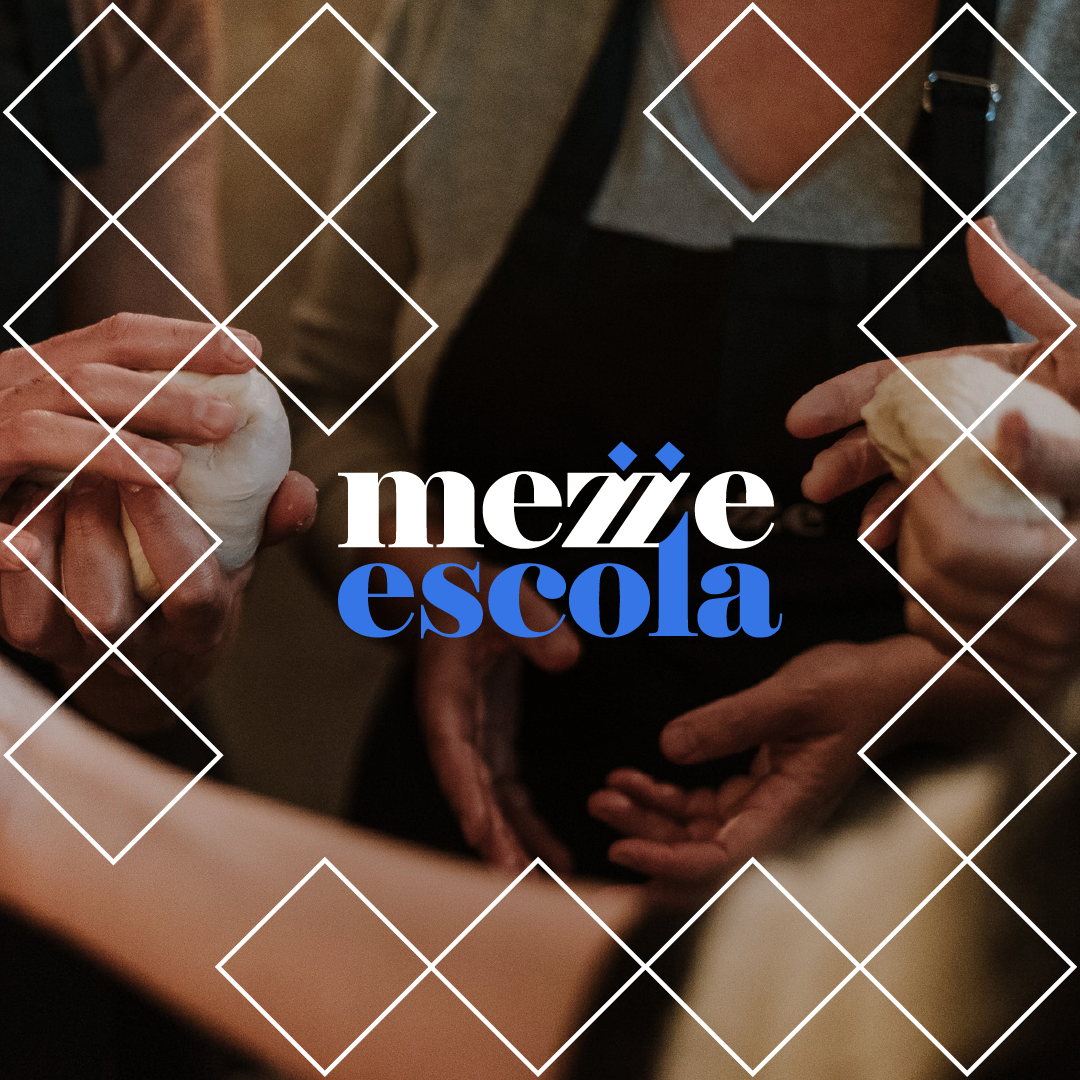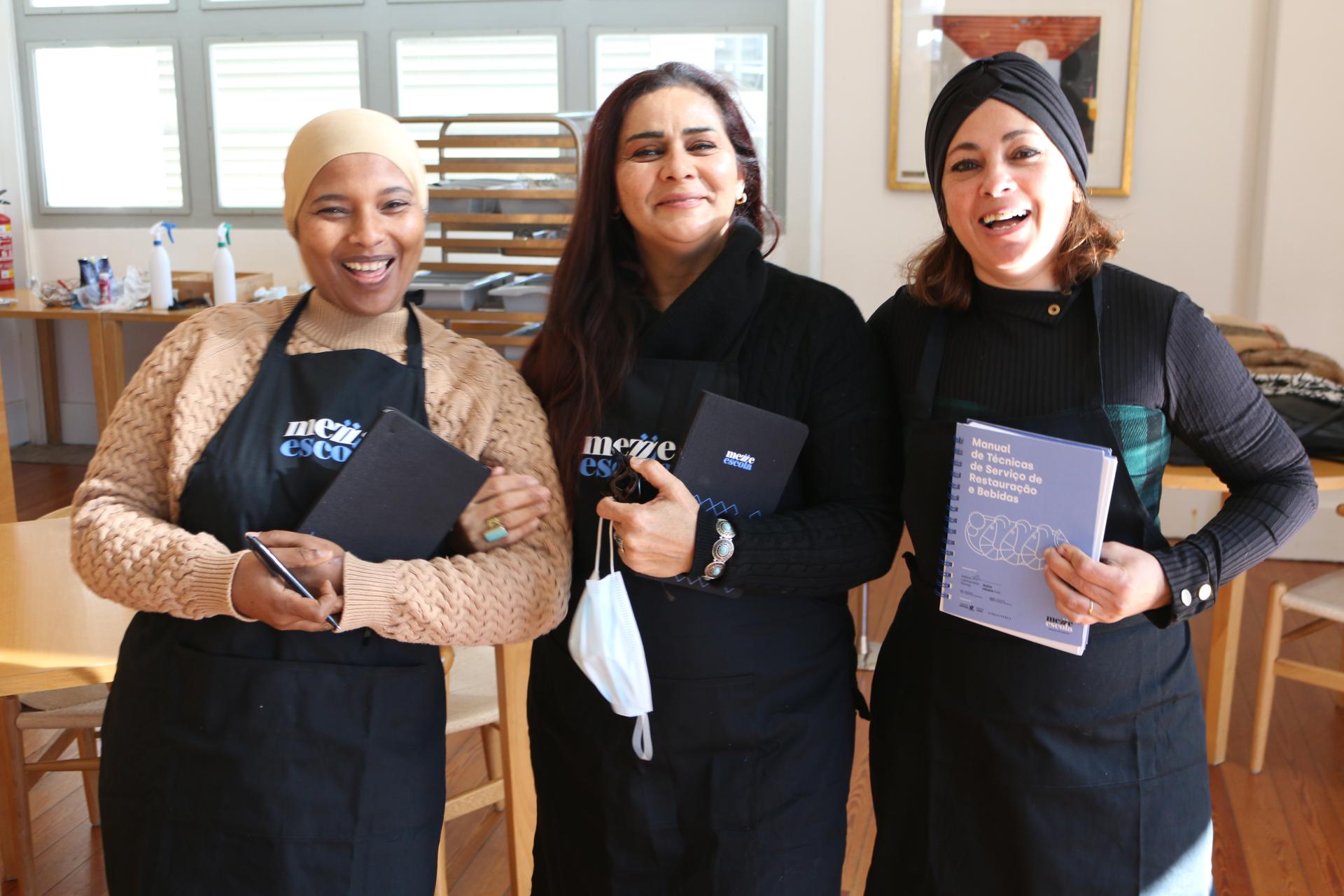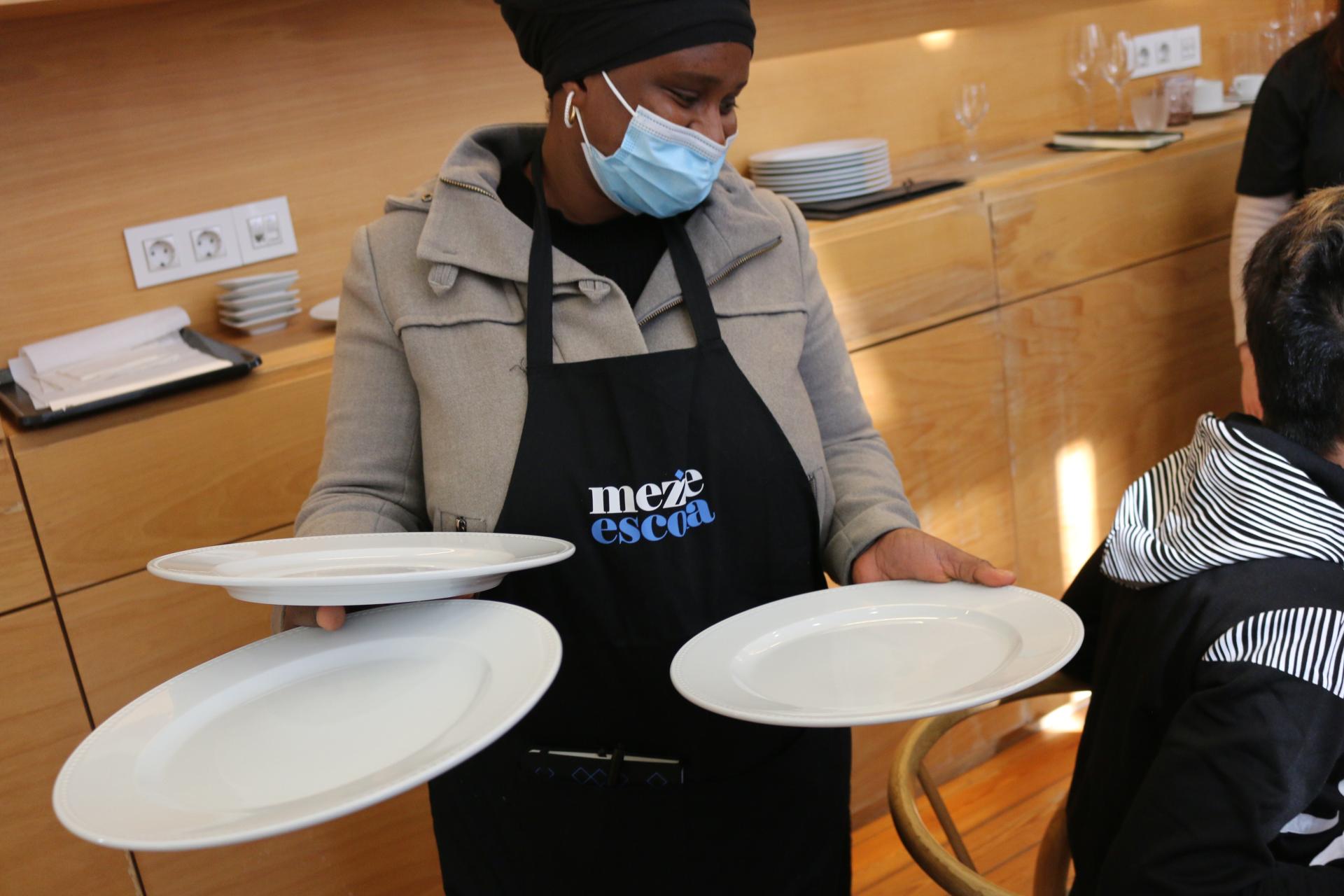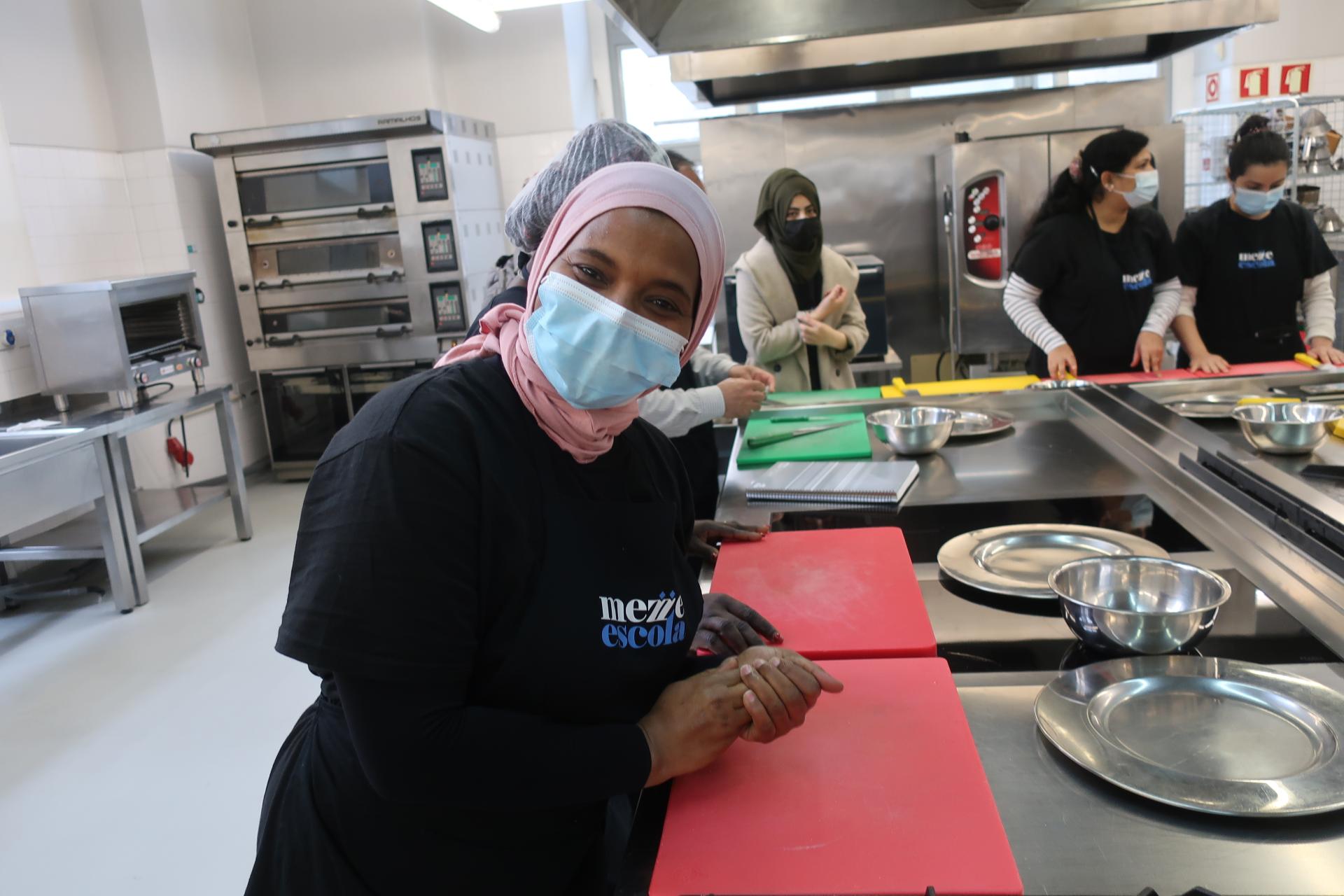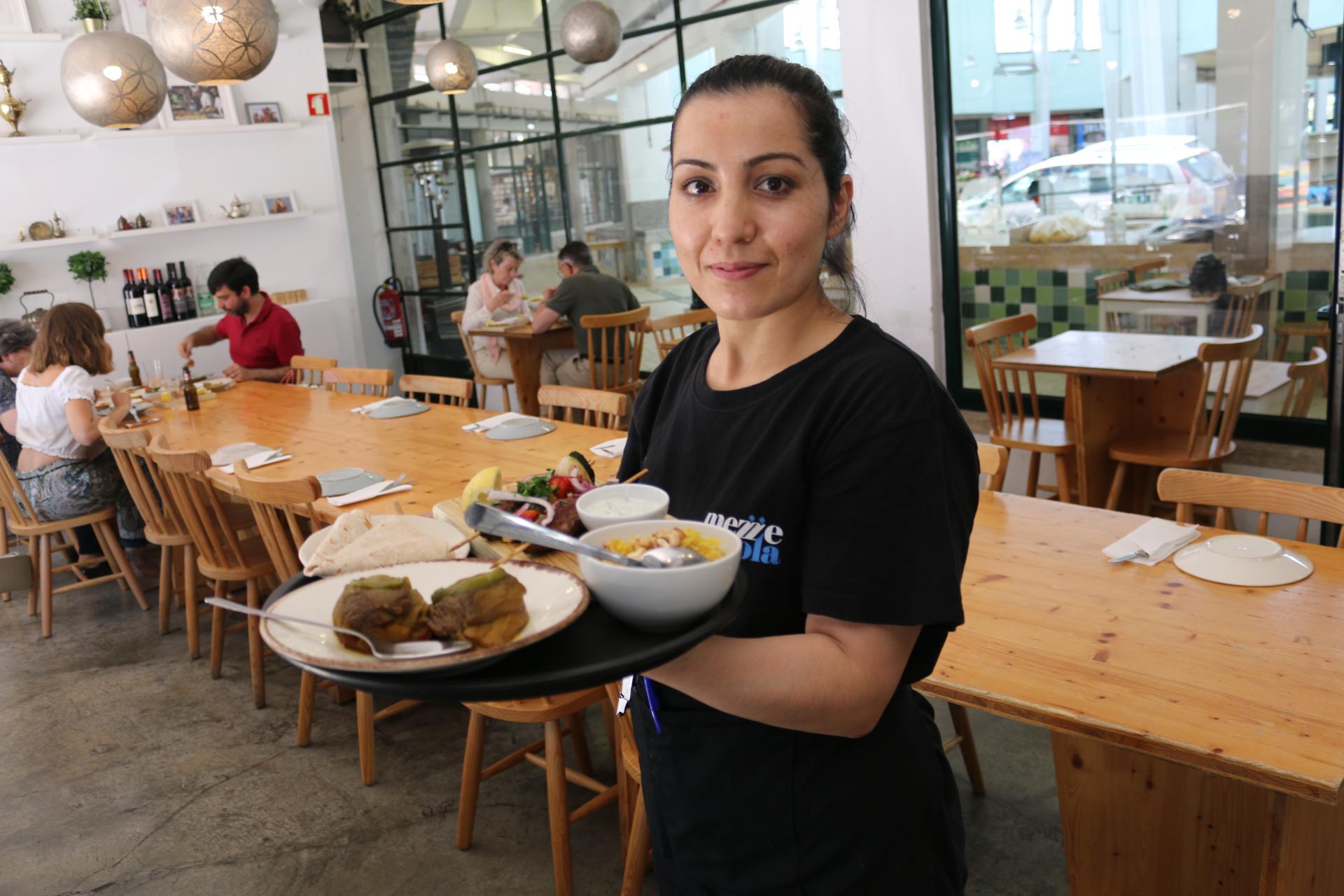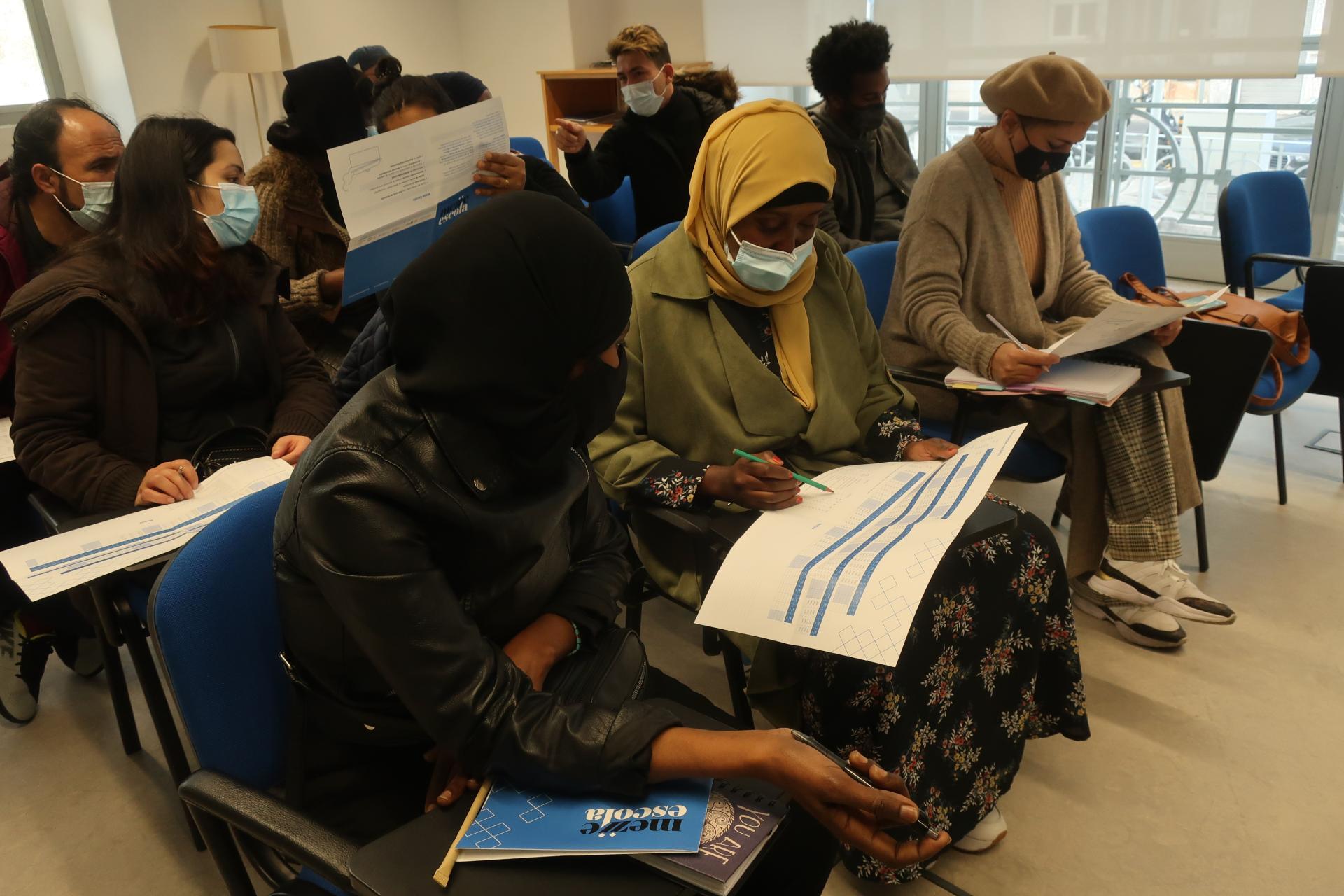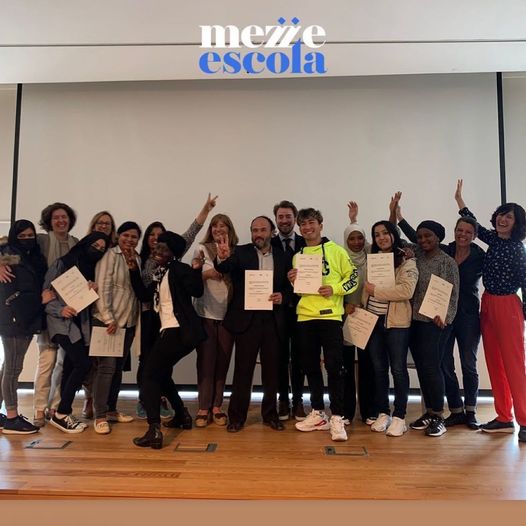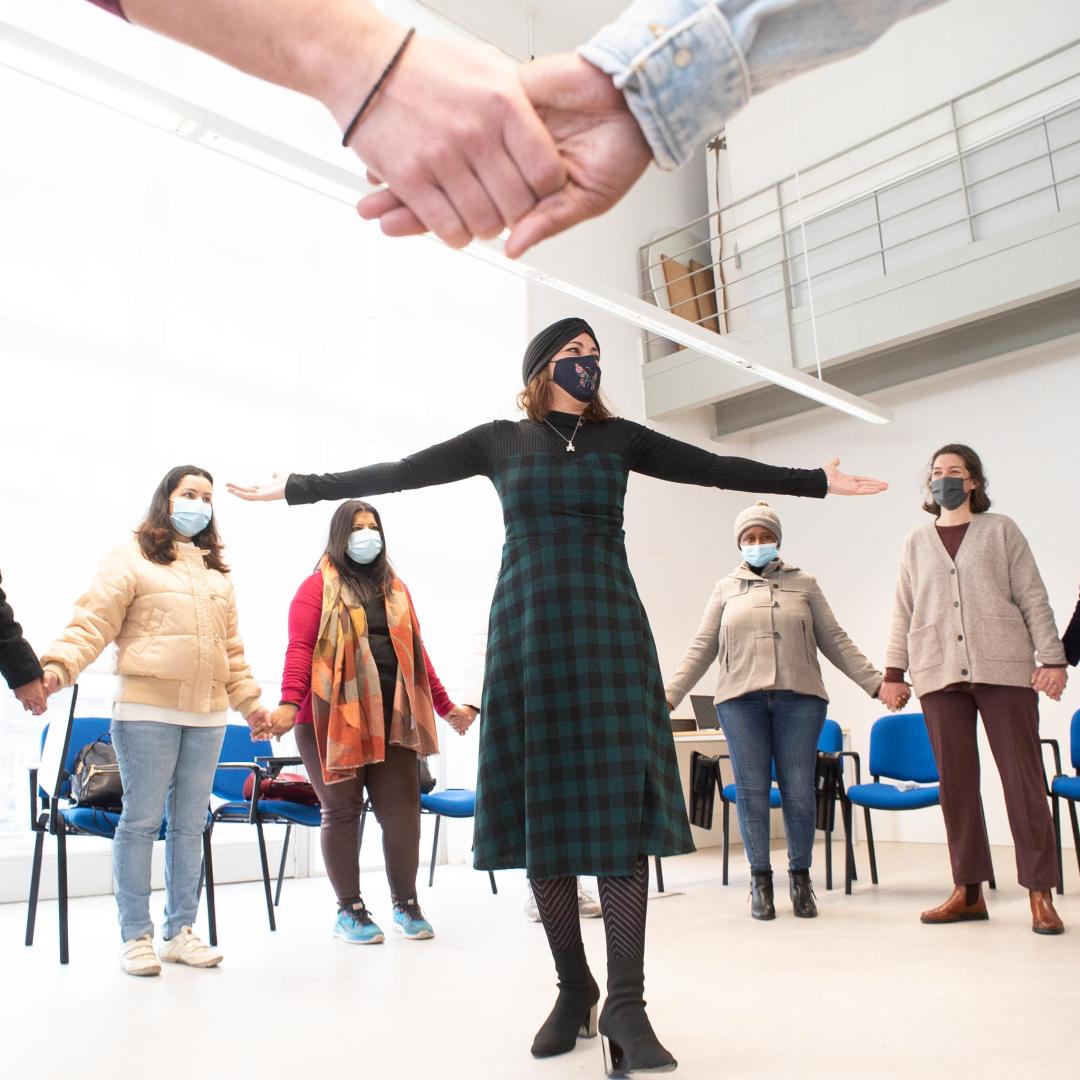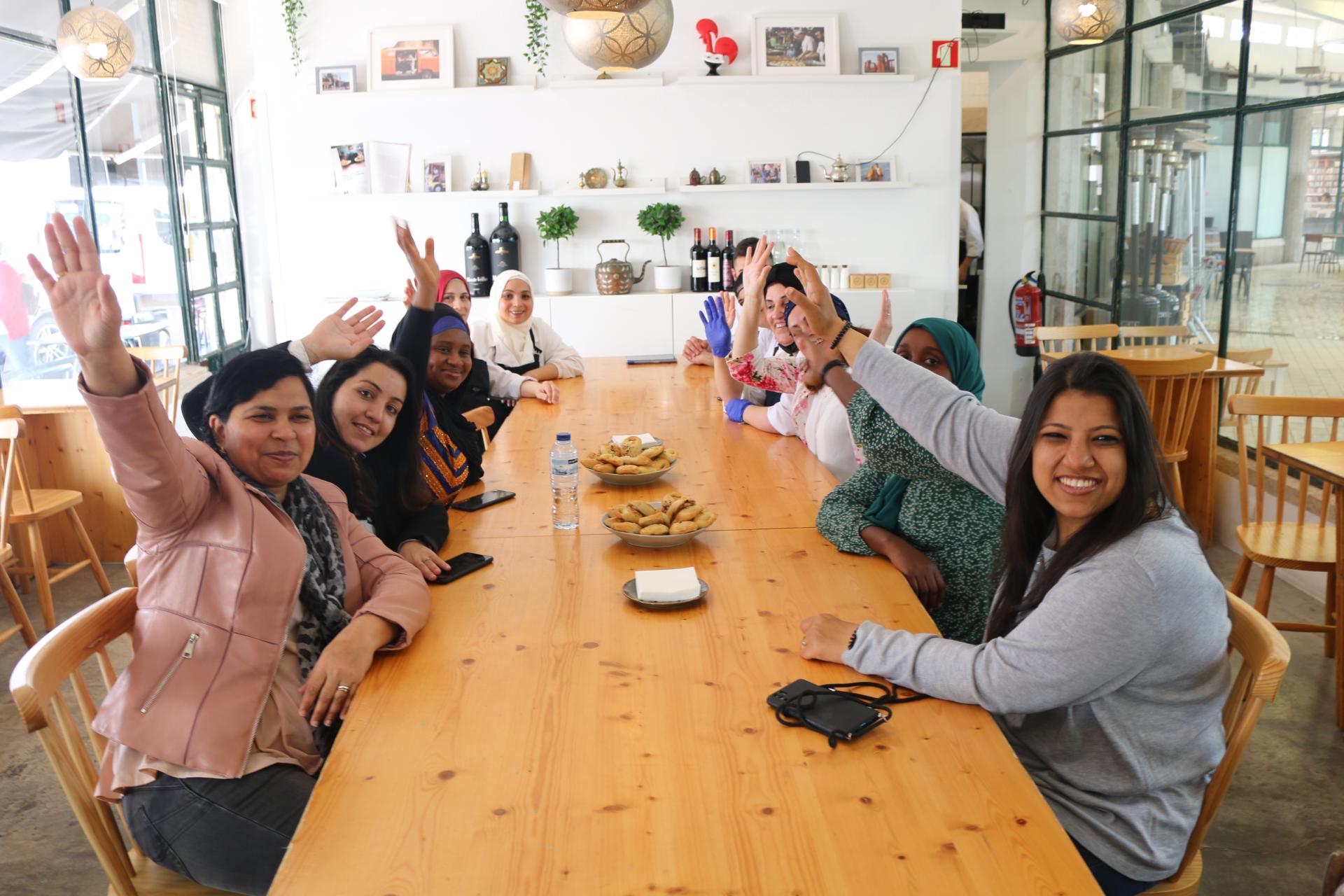Mezze-Escola Training Programme
Basic information
Project Title
Mezze-Escola Training Programme
Full project title
Mezze-Escola Training Programme
Category
Prioritising the places and people that need it the most
Project Description
Mezze-Escola is a rights based sustainable inclusion intervention that supports social and economic integration of migrants in European Countries. Through a 6 months certified program in the HORECA sector our beneficiaries gain both professional skills (with off and on-job training), and access to the labour market. In addition to the technical modules, our participants delve into critical topics such as personal and social development, language learning, sustainability, legislation and finance.
Geographical Scope
National
Project Region
Lisbon and Oporto, Portugal, although we are set to replicate the project across borders., Portugal
Urban or rural issues
Mainly urban
Physical or other transformations
It refers to other types of transformations (soft investment)
EU Programme or fund
Yes
Which funds
Other
Other Funds
EEA Grants - Active Citizens Fund, Capacity building program, 2020
Description of the project
Summary
Started in 2022, this project aims to improve employability and to support the process of integration of the immigrant and refugee community in the EU. To produce this change we use a rights-based approach, through the empowerment of the migrant community to exercise their rights (right to education -including behaviour change regarding sustainability - and right to fairly remunerated work) and duties (social and fiscal). Two paths of change complement each other to achieve this goal:
(i) Strengthening the professional skills of the migrant community, in the catering sector, through a 500h certified training programme. The context analysis reveals a high qualification deficit in the sector, being the qualification of human resources one of the main goals of the Tourism Strategy 2027. This pathway of change intervenes on the side of skills enhancement.
(ii) The second pathway of change empowers for the exercise of a full citizenship, aware of their rights and obligations. This pathway of change facilitates access to the labour market, in conditions of justice and responsibility.
The project benefits from the perception Portuguese society has of the migrant community, a phenomenon that has increased with the wave of refugees from Ukraine. It also benefits from the motivation of the migrant community to access qualifications that allow them to integrate in our country. Proof of this is the experience of Pão a Pão, whose work of training and job creation has motivated dozens of refugees to integrate into Portuguese society and remain active professionally, even after leaving the Association's staff.
A 3rd edition of the program is underway, fully directed to Ukrainian refugees. We’re expanding this program from Lisbon to Oporto in 2023, showcasing the sustainability of the initiative.
(i) Strengthening the professional skills of the migrant community, in the catering sector, through a 500h certified training programme. The context analysis reveals a high qualification deficit in the sector, being the qualification of human resources one of the main goals of the Tourism Strategy 2027. This pathway of change intervenes on the side of skills enhancement.
(ii) The second pathway of change empowers for the exercise of a full citizenship, aware of their rights and obligations. This pathway of change facilitates access to the labour market, in conditions of justice and responsibility.
The project benefits from the perception Portuguese society has of the migrant community, a phenomenon that has increased with the wave of refugees from Ukraine. It also benefits from the motivation of the migrant community to access qualifications that allow them to integrate in our country. Proof of this is the experience of Pão a Pão, whose work of training and job creation has motivated dozens of refugees to integrate into Portuguese society and remain active professionally, even after leaving the Association's staff.
A 3rd edition of the program is underway, fully directed to Ukrainian refugees. We’re expanding this program from Lisbon to Oporto in 2023, showcasing the sustainability of the initiative.
Key objectives for sustainability
Mezze-Escola is rights based intervention framed by a comprehensive understanding of sustainability.
On the upstream, the intervention is sustainable because it promotes an integration that is both:
● Based on certified skills (HORECA and Hospitality sectors) with high demand and limited offer in the Portugal and broadly speaking in Europe;
● Based on knowledge and understanding of rights and duties of target groups and how to exercise them, thus contributing to combat exclusion.
On the downstream, the intervention is sustainable from:
● Economic point of view, because it supports initial integration of beneficiaries in the labour market through a restaurant owned by the promoter that has been consistently profitable thus generating resources for the development of the intervention to other target groups;
● Environmental point of view through certified recycling policies and practices implemented both during the training programs organised (by our partner Hospitality and Tourism School of Lisbon) within the scope of the initiative and in the restaurant that supports the in integration of the target group in the labour market.
On the upstream, the intervention is sustainable because it promotes an integration that is both:
● Based on certified skills (HORECA and Hospitality sectors) with high demand and limited offer in the Portugal and broadly speaking in Europe;
● Based on knowledge and understanding of rights and duties of target groups and how to exercise them, thus contributing to combat exclusion.
On the downstream, the intervention is sustainable from:
● Economic point of view, because it supports initial integration of beneficiaries in the labour market through a restaurant owned by the promoter that has been consistently profitable thus generating resources for the development of the intervention to other target groups;
● Environmental point of view through certified recycling policies and practices implemented both during the training programs organised (by our partner Hospitality and Tourism School of Lisbon) within the scope of the initiative and in the restaurant that supports the in integration of the target group in the labour market.
Key objectives for aesthetics and quality
The intervention seeks complementary approaches to improve the quality of experience:
● of Refugees and Migrants by providing a responsible integration in social and economic life, the intervention that helps reduce the effects of trauma to which most refugees and migrants were exposed, strengthening the sense of belonging and active contribution to social and economic life. The intervention also shapes community within the target group.
● of the hosting Community, that through food transporting the culture, habits and beliefs of migrants but also their life stories, their challenges and dreams
● of Refugees and Migrants by providing a responsible integration in social and economic life, the intervention that helps reduce the effects of trauma to which most refugees and migrants were exposed, strengthening the sense of belonging and active contribution to social and economic life. The intervention also shapes community within the target group.
● of the hosting Community, that through food transporting the culture, habits and beliefs of migrants but also their life stories, their challenges and dreams
Key objectives for inclusion
The key principle of the intervention is that inclusion is a win-win challenge:
● From the perspective of Refugees and Migrants, this is an intervention that provides (professional) skills and (legal) knowledge that can be applied in any European Country (skills that are EU certified) or in the Home Country;
● From the perspective of the Hosting State, this is an intervention that generates a high return on investment: for each 1€ invested in rights based inclusion we generate 2,7€ of savings in social assistance. This means that, in fact, the intervention generates resources that can be reinvested in other inclusion initiatives by the State.
This sustainable rights based inclusion generates individual assets that are returned to the community with a high return on investment.
● From the perspective of Refugees and Migrants, this is an intervention that provides (professional) skills and (legal) knowledge that can be applied in any European Country (skills that are EU certified) or in the Home Country;
● From the perspective of the Hosting State, this is an intervention that generates a high return on investment: for each 1€ invested in rights based inclusion we generate 2,7€ of savings in social assistance. This means that, in fact, the intervention generates resources that can be reinvested in other inclusion initiatives by the State.
This sustainable rights based inclusion generates individual assets that are returned to the community with a high return on investment.
Results in relation to category
Having started in January 2022, this initiative has managed to directly reach within a year, just with one location, over 50 migrants - and their families - from 15 different nationalities (the majority of whom being refugees). Although the number isn’t great in the European context, we’re talking about a 6 months program, with externalities that go far beyond the outputs provided by the planned activities, namely the rate of employment (which has increased among participants - report to be launched on Q3 2023) and building of social networks for themselves and their families.
From the concluded activities and based on surveys with the participants, the number one metric regarding integration has shown very good results, with the large majority of beneficiaries stating a clear improvement on their feeling towards their new life condition and their hopes for a better future.
The replication of Mezze Escola will exponentially increase the number of participants throughout the upcoming years, even more with the ability of the program to adapt to new circumstances, populations and regions.
An indicator of the demand from our target group is given not only by the quick expansion to a new city (driven by the interest of new stakeholders), but also by the interest of new groups of refugees, whose requests for participation keep arriving on a regular basis, not only through the beneficiaries themselves, but also through the organisations that work with them.
For the future and on top of an already replicable approach, we’re planning to launch a chain of on-job training restaurants specifically designed to work symbiotically with the hospitality and tourism schools. This will not only consolidate the integration process but also the sustainability and scope of the intervention, which will include direct employment.
Finally, it is worth mentioning that Mezze-Escola was awarded the Hospitality Education Award 2022 for the best Innovation project in Portugal.
From the concluded activities and based on surveys with the participants, the number one metric regarding integration has shown very good results, with the large majority of beneficiaries stating a clear improvement on their feeling towards their new life condition and their hopes for a better future.
The replication of Mezze Escola will exponentially increase the number of participants throughout the upcoming years, even more with the ability of the program to adapt to new circumstances, populations and regions.
An indicator of the demand from our target group is given not only by the quick expansion to a new city (driven by the interest of new stakeholders), but also by the interest of new groups of refugees, whose requests for participation keep arriving on a regular basis, not only through the beneficiaries themselves, but also through the organisations that work with them.
For the future and on top of an already replicable approach, we’re planning to launch a chain of on-job training restaurants specifically designed to work symbiotically with the hospitality and tourism schools. This will not only consolidate the integration process but also the sustainability and scope of the intervention, which will include direct employment.
Finally, it is worth mentioning that Mezze-Escola was awarded the Hospitality Education Award 2022 for the best Innovation project in Portugal.
How Citizens benefit
Four different layers of directly affected stakeholders were involved in the design and management of the intervention and/or benefit from them:
● Migrants and Refugees:
- The ones that were involved in the curriculum design especially in what concerns the modules on labour, tax and legal rights and duties and how they could answer to the daily challenges faced by the community;
- The ones that benefit from the integration process provided by the initiative - access to rights (to a job, to an education);
● Industry leaders in the HORECA (Hospitality and Tourism Shcools, and Pão a Pão through the Mezze restaurant):
- the HORECA and Hospitality technical content of the training program
- the soft skills required to establish a positive relationship between employers and employees that have deep cultural differences and backgrounds;
● The restaurants and HORECA sector as whole, by having access to a new pool of trained workers, in an industry of high demand that is lacking human resources.
● Communities in general, where meaningful integration of migrants has, by contrast (to a no integration scenario), a deep positive impact across the board;
● Migrants and Refugees:
- The ones that were involved in the curriculum design especially in what concerns the modules on labour, tax and legal rights and duties and how they could answer to the daily challenges faced by the community;
- The ones that benefit from the integration process provided by the initiative - access to rights (to a job, to an education);
● Industry leaders in the HORECA (Hospitality and Tourism Shcools, and Pão a Pão through the Mezze restaurant):
- the HORECA and Hospitality technical content of the training program
- the soft skills required to establish a positive relationship between employers and employees that have deep cultural differences and backgrounds;
● The restaurants and HORECA sector as whole, by having access to a new pool of trained workers, in an industry of high demand that is lacking human resources.
● Communities in general, where meaningful integration of migrants has, by contrast (to a no integration scenario), a deep positive impact across the board;
Physical or other transformations
It refers to other types of transformations (soft investment)
Innovative character
The intervention looks at complex problems from a multi-stakeholders perspective:
● We strength skills, but we also promote responsible inclusion based on rights and duties;
● We strengthen the sense of belonging of target groups in the host community but we also contribute to improve the knowledge of the host community on culture and habits of the refugees and migrants communities;
● We have a social inclusion intervention that is complemented by an economically and financially feasible business.
● The intervention is sponsored by donors but generates positive financial externalities that can be valued up to 270K EUROS (for which 100K invested) in social assistance savings for the host country that then can be reinvested by the State in other inclusion activities.
● We strength skills, but we also promote responsible inclusion based on rights and duties;
● We strengthen the sense of belonging of target groups in the host community but we also contribute to improve the knowledge of the host community on culture and habits of the refugees and migrants communities;
● We have a social inclusion intervention that is complemented by an economically and financially feasible business.
● The intervention is sponsored by donors but generates positive financial externalities that can be valued up to 270K EUROS (for which 100K invested) in social assistance savings for the host country that then can be reinvested by the State in other inclusion activities.
Disciplines/knowledge reflected
The design, development and improvement of the initiative was and is based on the knowledge of several stakeholders and expertise, which sustains the rights-based approach that drives the initiative through different angles.
Pão a Pão association (PAP) and its workers contributed with the consolidated knowledge of several years of working together within and for the migrant community. Dozens of refugees and immigrants throughout several years of employment gave PAP a clear view of the soft and hard skills required for a proper integration through the HORECA sector context. We also included our awareness of the needs and lack of information that may limit the claim of rights of the beneficiaries, namely lack of language skills, financial literacy, legislation knowledge and sense of individual and collective sustainability.
Hospitality and Tourism School of Lisbon, whose track record on certified education for the sector spreads across several decades, was the main driver to set up technical approaches to the program, and to provide a safe learning context adapted to the target group. Language barriers and cultural differences in relation to gastronomy and customer service are addressed by their approach.
Despite this collective knowledge, Pão a Pão, as leader of the initiative, also reached out to Nova SBE university with two main goals in mind:
● To clearly identify the main factors of integration through the labour market within our target group, which resulted in the implementation of a 75hr module focused on personal and social development.
● To conceive and adapt an approach on sustainability within the initiative, that could spread across all fields of knowledge that are taught to participants.
This interaction between the mentioned stakeholders resulted in a new and broad approach within the education-employment-sustainability sphere, able to support our goals for an integration through rights.
Pão a Pão association (PAP) and its workers contributed with the consolidated knowledge of several years of working together within and for the migrant community. Dozens of refugees and immigrants throughout several years of employment gave PAP a clear view of the soft and hard skills required for a proper integration through the HORECA sector context. We also included our awareness of the needs and lack of information that may limit the claim of rights of the beneficiaries, namely lack of language skills, financial literacy, legislation knowledge and sense of individual and collective sustainability.
Hospitality and Tourism School of Lisbon, whose track record on certified education for the sector spreads across several decades, was the main driver to set up technical approaches to the program, and to provide a safe learning context adapted to the target group. Language barriers and cultural differences in relation to gastronomy and customer service are addressed by their approach.
Despite this collective knowledge, Pão a Pão, as leader of the initiative, also reached out to Nova SBE university with two main goals in mind:
● To clearly identify the main factors of integration through the labour market within our target group, which resulted in the implementation of a 75hr module focused on personal and social development.
● To conceive and adapt an approach on sustainability within the initiative, that could spread across all fields of knowledge that are taught to participants.
This interaction between the mentioned stakeholders resulted in a new and broad approach within the education-employment-sustainability sphere, able to support our goals for an integration through rights.
Methodology used
Mezze-Escola is an initiative whose planning and implementation is guided by the theory of change, based on rights. This approach is supported by a logical framework and an integrated monitoring and evaluation system that ensures learning and adaptation throughout the integration cycles.
The project is based on a model that incorporates the teaching methodology of the Hospitality and Tourism School of Lisbon, the on-job experience of the PAP, and also the academic knowledge, supporting the training model in a "human centered design" perspective, where the solution is built around the beneficiaries.
All the activities are divided according to specific objectives to which they correspond, comprising outputs, outcomes and their indicators, which together respond to the transformation process that is intended to be achieved.
This approach ensures that all the locations where the initiative is being implemented, follows the same pathway, independently of the local stakeholders.
The outputs are framed within main activities, namely:
● +500hr of on-job and “class room” training, divided by a set o modules focused on technical and soft skills;
● Connection to the labour market, by establishing local partnerships with employers, willing to suppress the high-demand for skilled workers within the industry.
To support both activities, the curriculum, the contents and the schedules are adapted according to the needs of our beneficiaries, and follow the learning curve that results from the implementation, the monitoring and the evaluation.
The project is based on a model that incorporates the teaching methodology of the Hospitality and Tourism School of Lisbon, the on-job experience of the PAP, and also the academic knowledge, supporting the training model in a "human centered design" perspective, where the solution is built around the beneficiaries.
All the activities are divided according to specific objectives to which they correspond, comprising outputs, outcomes and their indicators, which together respond to the transformation process that is intended to be achieved.
This approach ensures that all the locations where the initiative is being implemented, follows the same pathway, independently of the local stakeholders.
The outputs are framed within main activities, namely:
● +500hr of on-job and “class room” training, divided by a set o modules focused on technical and soft skills;
● Connection to the labour market, by establishing local partnerships with employers, willing to suppress the high-demand for skilled workers within the industry.
To support both activities, the curriculum, the contents and the schedules are adapted according to the needs of our beneficiaries, and follow the learning curve that results from the implementation, the monitoring and the evaluation.
How stakeholders are engaged
This initiative is guided by a partnership between Pão a Pão Association (PAP), a Non-Profit with projects across Portugal, and Tourism of Portugal (TP), through their Hospitality and Tourism Schools.
On a local level, there are partnerships between TP schools and local restaurants for off and on-job training. PAP is responsible for managing not only the project, but also the on-job training in Lisbon, through its Mezze restaurant, which was created for the employment and integration of refugees.
Participants are accessed through local NGO’s and public institutions who deal with migrants, while funding is gathered through different sources, namely the implementing partners own revenues, grants, and donations from civil society.
The transition of participants into the labour market is based both on the support of government programs focused on employment (financial support) and partnerships with local or national chains of restaurants and hotels.
Contents of the program are also a result of multiple stakeholders brought together: Hospitality schools, through their proven background on a technical level; PAP and its workers (which are also the beneficiaries), by bringing +5 years of knowledge of working together into the design of the modules (needs, doubts, challenges, cultural differences); and Nova SBE university, through not only an R&D work on the main factors of integration through the labour market, as well as their tailor-made work to embed sustainability practices in the program (see next section for more details).
In addition, the initiative was developed with focus on replication, both nationally and internationally, with the initial expansion being set to start in Oporto in May 2023.
The concept of local partnerships, based upon a network of stakeholders, with continuous evaluation and adaptation, gives Mezze-Escola full flexibility to move across regions without losing focus on the main goals of integration, sustainable inclusion and education.
On a local level, there are partnerships between TP schools and local restaurants for off and on-job training. PAP is responsible for managing not only the project, but also the on-job training in Lisbon, through its Mezze restaurant, which was created for the employment and integration of refugees.
Participants are accessed through local NGO’s and public institutions who deal with migrants, while funding is gathered through different sources, namely the implementing partners own revenues, grants, and donations from civil society.
The transition of participants into the labour market is based both on the support of government programs focused on employment (financial support) and partnerships with local or national chains of restaurants and hotels.
Contents of the program are also a result of multiple stakeholders brought together: Hospitality schools, through their proven background on a technical level; PAP and its workers (which are also the beneficiaries), by bringing +5 years of knowledge of working together into the design of the modules (needs, doubts, challenges, cultural differences); and Nova SBE university, through not only an R&D work on the main factors of integration through the labour market, as well as their tailor-made work to embed sustainability practices in the program (see next section for more details).
In addition, the initiative was developed with focus on replication, both nationally and internationally, with the initial expansion being set to start in Oporto in May 2023.
The concept of local partnerships, based upon a network of stakeholders, with continuous evaluation and adaptation, gives Mezze-Escola full flexibility to move across regions without losing focus on the main goals of integration, sustainable inclusion and education.
Global challenges
Despite the positive responses to the reception of refugees and immigrants in Europe, recently demonstrated with the solidarity towards the Ukrainian population, there are still problems in the integration and insertion in the labour market of these more vulnerable groups.
Obstacles such as the language, professional inexperience, mistrust of a new context, the loss or inexistence of documents proving their qualifications and cultural shock, contribute to the fact that the unemployment rate among the immigrant population is higher than among the European population and that their integration in society is slower and more complex. Therefore, there is an undeniable need to improve and reinforce solutions that are able to respond to this fragility in the process of integration of the migrant population.
Thus, this initiative is justified by the need to boost employability and to empower this population, not only in a given technical area, but also by encouraging the exercise of full citizenship - knowing their rights and duties.
Obstacles such as the language, professional inexperience, mistrust of a new context, the loss or inexistence of documents proving their qualifications and cultural shock, contribute to the fact that the unemployment rate among the immigrant population is higher than among the European population and that their integration in society is slower and more complex. Therefore, there is an undeniable need to improve and reinforce solutions that are able to respond to this fragility in the process of integration of the migrant population.
Thus, this initiative is justified by the need to boost employability and to empower this population, not only in a given technical area, but also by encouraging the exercise of full citizenship - knowing their rights and duties.
Learning transferred to other parties
Replicability was at the basis of our initiative from the start. Various aspects are worth mentioning to sustain this statement:
● The establishment of a collaborative approach with the Hospitality Schools in Portugal, which are spread across 13 regions in Portugal, all functioning in similar ways and with similar processes and resources;
● The ability to establish partnerships and adapt to different stakeholders, namely restaurants and hotels, to provide on-job training;
● The use of teaching and learning approaches based on flexible modules that aren’t dependent on one particular context, institution or location; the elasticity of the content allows it to be translated, adapted and transferred according to the needs of specific audiences;
● The guidance and supervision of one organisation (Pão a Pão Association), working as a guarantor of the methodology, but also as a driver of innovation (through new contents and partnerships) to set up the project for the future, independently of the location;
After 3 editions of the integration program in Lisbon, we’re expanding to Oporto, where the implementation partners will be different from the ones in Lisbon: different school, different on-job training partners, different employers, different NGO’s connecting to our target group, but all under the exact same methodology and approach.
Our flexibility and ability to expand is also reflected on the spectrum of population we can work with. We’ve started by addressing the integration of 15 refugees and immigrants from 9 different nationalities (from Syria to Afghanistan, from Morocco to Romania), and we are currently working for the integration of 22 refugees from Ukraine.
None of what constitutes the initiative is limited by borders. The “Portuguese experience” can move across Europe, as long as the intangible assets, namely the framework and methodology are maintained.
● The establishment of a collaborative approach with the Hospitality Schools in Portugal, which are spread across 13 regions in Portugal, all functioning in similar ways and with similar processes and resources;
● The ability to establish partnerships and adapt to different stakeholders, namely restaurants and hotels, to provide on-job training;
● The use of teaching and learning approaches based on flexible modules that aren’t dependent on one particular context, institution or location; the elasticity of the content allows it to be translated, adapted and transferred according to the needs of specific audiences;
● The guidance and supervision of one organisation (Pão a Pão Association), working as a guarantor of the methodology, but also as a driver of innovation (through new contents and partnerships) to set up the project for the future, independently of the location;
After 3 editions of the integration program in Lisbon, we’re expanding to Oporto, where the implementation partners will be different from the ones in Lisbon: different school, different on-job training partners, different employers, different NGO’s connecting to our target group, but all under the exact same methodology and approach.
Our flexibility and ability to expand is also reflected on the spectrum of population we can work with. We’ve started by addressing the integration of 15 refugees and immigrants from 9 different nationalities (from Syria to Afghanistan, from Morocco to Romania), and we are currently working for the integration of 22 refugees from Ukraine.
None of what constitutes the initiative is limited by borders. The “Portuguese experience” can move across Europe, as long as the intangible assets, namely the framework and methodology are maintained.
Keywords
Migration
Employment
Rights
Sustainability
Education

